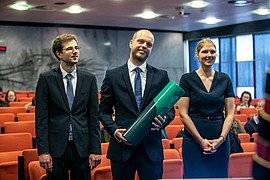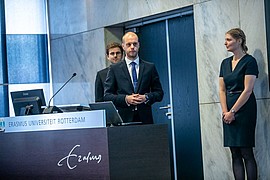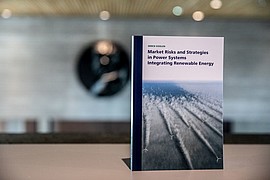PhD Defence: Derck Koolen

In his dissertation ‘Market Risks and Strategies in Power Systems Integrating Renewable Energy’ Derck Koolen assesses the integration of intermittent renewable energy sources in relation to agents' risk preferences and decision strategies in short-term sequential power markets via a multi-method approach.
Derck Koolen defended his dissertation in the Senate Hall at Erasmus University Rotterdam on Friday, 22 March 2019 at 13:30. His supervisors were Prof. Wolf Ketter (RSM) and Dr Ronald Huisman (ESE). Other members of the Doctoral Committee are Prof. Alok Gupta (University of Minnesota), Prof. Machiel Mulder (Rijksuniversiteit Groningen), Prof. Eric van Heck (RSM), Prof. Marc Oliver Bettzüge (University of Cologne, Germany) and Dr Yashar Ghiassi-Farrokhfal (RSM).
About Derck Koolen

Derck Koolen was born in 1991 in The Hague, the Netherlands. He obtained his Bachelor of Science in Mechanical Engineering and Master of Science in Energy Engineering cum laude from the University of Leuven in Belgium. Derck further studied Power Systems and Markets at the Institut Polytechnique de Grenoble in France and worked as an energy economist for a German grid operator, before starting his PhD research in 2014 at the Department of Technology and Operations Management of the Rotterdam School of Management, Erasmus University.
In his research, Derck focuses on a quantitative analysis of strategic decision making, risk preferences and sequential pricing in electricity markets with an increasing share of intermittent renewable energy sources. Derck presented his research widely at top peer-reviewed conferences and won the Best Student Paper Award at the International Association for Energy Economics (IAEE) conference. His work also gained broad media coverage and has been presented to relevant practitioners and policy makers. During his PhD, Derck spent time as a visiting scholar at London Business School in the United Kingdom and the Haas School of Business, University of California Berkeley in the United States.
Derck has been involved in teaching courses for MBA and MSc students and has supervised over 25 master thesis projects with practical relevance. He further served as an advisor for RSM teams in international business case competitions and has experience as freelance writer and consultant offering expertise in energy systems and markets, power economics, and technology and innovation policy.
Thesis Abstract

Energy businesses are going through a series of swift and radical transformations to meet the growing demands for sustainable energy. The integration of wind and solar introduces more low marginal costs suppliers to power markets, as no fuels are needed to produce electricity. Most power produced by renewable energy sources is however variable and difficult to predict by nature, putting current power system operations under pressure and causing prices to fluctuate heavily. Increased competition, new production technologies, and volatile prices completely changed operations in today’s power markets.
In this dissertation, we assess the integration of intermittent renewable energy sources in relation to agents' risk preferences and decision strategies in short-term sequential power markets via a multi-method approach. First, we analytically identify a technology-varying forward risk premium in relation to hedging needs of heterogeneous producers and retailers. Second, we empirically validate a multi-factor propositional framework, incorporating various renewable technologies, and provide evidence for market non-neutralities between these technologies. Third, we indicate a convenience yield for flexibility in a developed experimental trading environment and empirically evaluate strategies of intermittent and non-intermittent producers in forward and spot markets.
With the ongoing decarbonization, power markets should provide adequate price signals for assets and investments to ensure an efficient and sustainable energy transition. The work paves the way for policymakers to investigate the implications of intermittent renewable energy sources on existing market structures and their participants' strategic space. It further devises key ingredients for well-functioning sustainable power markets, its design and governing policies.
Photos: Chris Gorzeman / Capital Images


